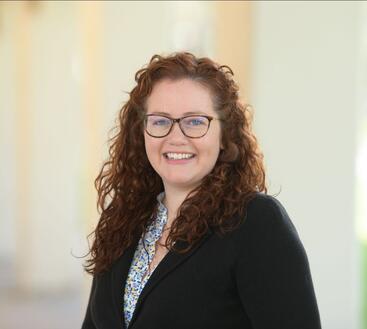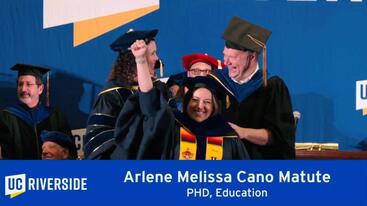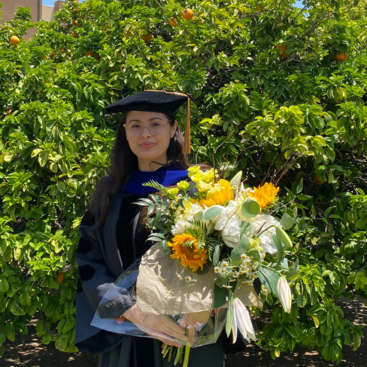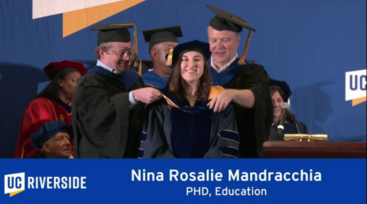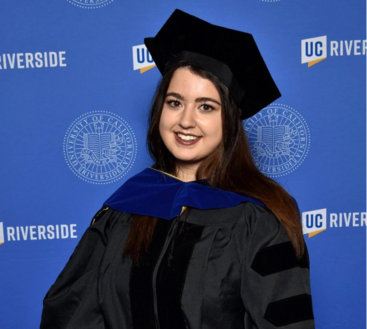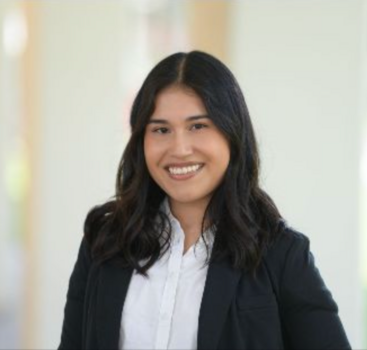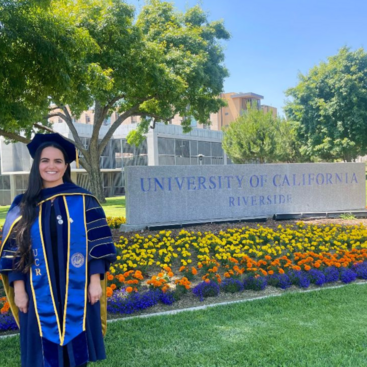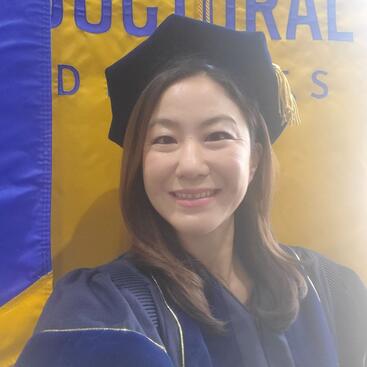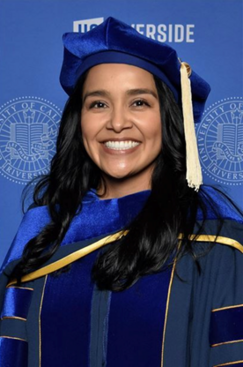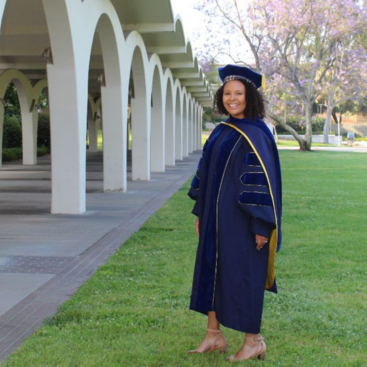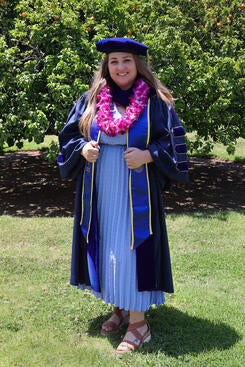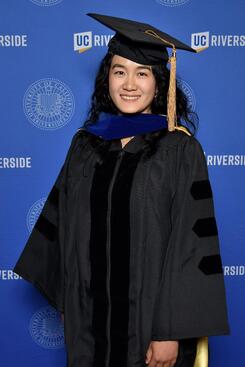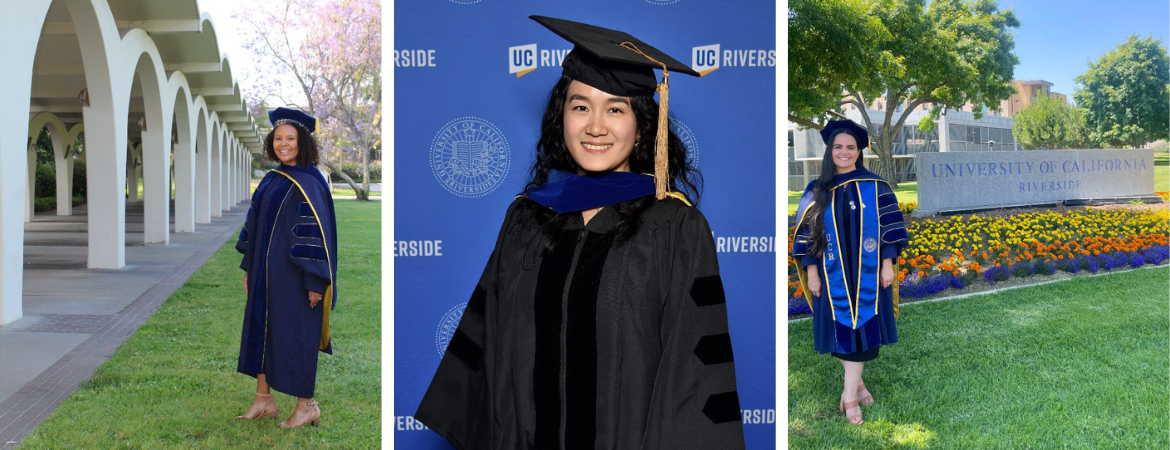
The School of Education is proud to announce and celebrate our doctoral graduates who successfully defended their dissertations this academic year. Below is a list of final dissertations from all 2022-2023 Doctoral Graduates.
Name: Liz Baker
Dissertation title: Unlocking Clinical Outcomes: Exploring Individual Differences, Intervention Strategies, and Neural Reward Systems in Autistic Children and Adolescents
Dissertation abstract: This dissertation examines event-related potentials (ERPs), measured from electroencephalogram (EEG) recordings, of social and nonsocial reward processing in a predominantly Latinx group of autistic children and teens before and after intervention. Additionally, this investigation proposes using objective, neuroscientific techniques to measure clinical trial effects of oxytocin administration, a neuropeptide associated with social behaviors.
Chapter 1 investigates neural response and attenuation of social and nonsocial rewards via the reward positivity component (RewP) in autistic and non-autistic adolescents before and after participation in the Program for the Education and Enrichment of Relational Skills (PEERS) intervention. Increased reward sensitivity was observed during the first half of trials in the autistic group after intervention. Neural correlates of reward also predicted improvements in social behavior. This suggests that participating in PEERS increases reward system sensitivity in autistic teens and that PEERS may be most effective for teens who have “room to grow” in their social reward responsivity.
Chapter 2 examines individual differences in anticipation of and response to rewards in autistic and non-autistic teens before and after PEERS. Older adolescents and those with lower parent-reported social motivation prior to participation in PEERS displayed increased social reward anticipation (more robust stimulus-preceding negativity; SPN) from pre- to post-intervention. Participants who displayed more parent-reported social motivation before intervention and were more actively engaged in the PEERS intervention, evidenced by increased social reward processing (more robust RewP) from pre- to post-intervention. Findings support a ‘precision model’ approach to autism intervention with an emphasis on brain-based outcomes.
Chapter 3 reviews the therapeutic effects of oxytocin on social behaviors in autistic individuals, focusing on functional outcomes from neuroimaging investigations. Additionally, this chapter proposes a model for clinical trials that includes simultaneous behavioral intervention and oxytocin administration and the hypothesized role of the neural reward system on intervention outcomes. In sum, this dissertation examines neural measures of reward-related brain activity as an outcome measure of intervention in autistic populations and proposes methods for future studies examining combined treatment effects of behavioral and oxytocin interventions.
Dissertation link: Chapter 1, Chapter 2, Chapter 3
Committee: Katherine Meltzoff (Chair), Jan Blacher (Member), Stephanie Moore (Member)
What’s next: In June, I will begin my clinical internship at the VA Maryland Health Care System / University of Maryland-School of Medicine Psychology Internship Consortium. I will perform mental health interventions and therapy with students in a Baltimore City elementary school. Additionally, I plan to expand the focus of my research to include school mental health and well-being among students.
Reflection: I am excited to apply the training, skills, and knowledge I gained from the UCR SOE to a new educational environment in Baltimore! I have gained a fantastic and comprehensive foundation in school psychology and child development, and I am excited to spread my wings and hone my clinical skills. As I continue my clinical and academic journey, I know I can always reach out to my UCR mentors and advisors to continue to receive valuable guidance and advice.
Name: Arlene Cano Matute
Dissertation title: Lo Que Nace del Corazón, Siempre Crece: The Origins of Serving at a Hispanic Serving Research Institution the University of California, Riverside
Dissertation abstract: Pending final publication.
Committee: Tara J. Yosso (Chair), Carlos E. Cortés (Member), Begoña Echeverria (Member)
What’s next: As a Chicana, first-generation, system-impacted, motherscholar, I'm proud of how far minoritized communities have come, but I recognize the lucha continua. Working alongside my community to create transformational change as a scholar, practitioner, and advocate is an honor. I aspire to continue doing this critical work as a faculty and administrator at a Hispanic Serving Research Institution. In addition, I strive to expand my interdisciplinary research on the historical and present experiences of Chicana/o/x & Latina/o/x scholars at HSIs by centering their voices to produce student-centered and community-based interventions. Most significantly, I remain dedicated to mentoring the next generation of scholars and advocates who aspire to serve the community with intentionality, purpose, and compassion.
Reflection: I am a proud triple highlander; UCR has become my home. My research, a Participatory Action Research project, was done together with Chicanx/Latinx scholars at UCR, and it has been life-changing to do it while working full-time as the Assistant Director in the office of Chicano Student Programs and raising my twins, Maya & Mateo, who grounded and inspired me throughout this journey. I am thankful to my village for your trust and support, the elders whose legacy of serving the comunidad paved the way for me to be here, and my beloved family, friends, colleagues, and mentors; gracias for your care. I’d especially like to thank my husband Jaime for being my best friend before/during/after this degree, my ESPARiTU research familia who are brilliant scholars that I am so proud of, Estella Acuña, my UCR familia since day one, the Chicano Student Programs center staff & student leaders you do it ALL, thank you, my dissertation committee who became cherished mentors, and the fiercest dissertation chair and femtor Dr. Tara J. Yosso, mil gracias!
To my scholar Hermana and Chicano Student Programs familia, Margarita Vizcarra, may you rest in power amiga.
Name: Valeria Dominguez
Dissertation title: Counter-Stories of Women of Color Navigating the Trusteeship: A Critical Race Feminism Analysis of the Organizational Culture of Higher Education Boards in the U.S.
Dissertation abstract: This dissertation explores the internal cultures of (14) United States higher education boards from the perspectives of (18) Women of Color trustees. Guided by Critical Race Feminism, Intersectionality, and Organizational Culture Theory, the author develops a framework to study the impact of race and gender on historically underrepresented Women of Color Trustees. The counter-stories presented in this analysis inform how internalized behaviors, norms, and interactions of trustees reinforce racial and gender inequity on higher education boards. Moreover, the study poses the unique contributions of Women of Color trustees as leaders in higher education. This dissertation’s novelty comes from the lack of governance scholarship informed through the lens of Women of Color. The findings of the study contribute to the empirical and theoretical work in governance research and provide guidance for any Women of Color interested in the trusteeship.
Key words: Women of color, higher education governance, boards of trustees, organizational culture
Committee: Raquel M. Rall (Chair), Eddie Comeaux (Member), Rican Vue (Member)
What’s next: I will be lecturing at UCR’s School of Education this summer and am looking for opportunities in the Fall.
Reflection: I began my journey at UCR as an undergraduate student over ten years ago, and I am thankful for the wonderful people I had the chance to meet during my time at UCR. My family, students, colleagues, and incredible advisor, Dr. Rall, gave me much strength and encouragement as I navigated being the first in my family to reach this milestone. I was honored to be selected as the commencement speaker and student marshal for this year's Ph.D. hooding ceremony because it was a tribute to the many years of service and advocacy I spent at UCR and within the larger UC system. It was a beautiful way to wrap up my journey as a graduate student. I look forward to sharing my work with the broader community and connecting with people who want to remove barriers in diversifying higher education leadership. I hope to work towards a higher education landscape that reflects our student, staff, and faculty body through increased awareness, accountability, and revisioning of higher education governing boards.
Name: Zaira Jimenez
Dissertation title: Effects of a Reading and Reading Plus Behavior Intervention for Students With Autism: A Secondary Analysis of an Alternating Treatment Study
Dissertation abstract: Problem behavior, such as non-engagement, impacts academic outcomes (McIntosh et al., 2008; Morgan et al., 2008; Nelson et al., 2003; Roberts et al., 2015). Theories examining the relationship between problem behavior and academics suggest the following regarding the directionality of the relationship: (a) academic challenges lead to problem behavior, (b) problem behavior leads to academic challenges, (c) academic challenges and problem behavior co-occur, and (d) attention related challenges lead to academic challenges and problem behavior (Hinshaw, 1992; McIntosh et al., 2008; Morgan et al., 2008). Additionally, they emphasize the importance of addressing problem behavior concurrently with academics. This is crucial for students with autism, seeing that academic challenges (e.g., reading comprehension) and problem behavior have been consistently reported as challenges for students with autism (Belardinelli et al., 2016; Huemer & Mann, 2010; Solis et al., 2016; Volkmar et al., 2014). However, there is limited research on reading comprehension and behavior interventions for students with autism focused on behavior interventions and outcomes. To address this gap in research, the present study analyzed levels of engagement through a secondary analysis of an alternating treatment single-case design study (N = 3) that was entirely implemented via a distance learning platform during Covid-19. This secondary analysis sought to compare the relative effects of a pre-developed reading intervention (Solis et al., 2022) to a reading intervention that embedded behavior supports (i.e., behavior expectations, visual schedule) on student engagement levels. Study effects were analyzed through a visual analysis (WWC, 2022). The results indicated that the reading intervention that embedded the behavior supports was not more effective than the reading intervention that did not embedded the behavior supports. Engagement levels increased for one out of three participants during the reading plus behavior intervention. For the additional two participants, engagement levels slightly increased during the reading plus behavior intervention. Surprisingly, engagement levels were high across participants and interventions, despite using a distance learning platform. The percentage of intervals with engagement ranged from 66% to 99% in the reading only intervention and from 75% to 100% in the reading plus behavior intervention. Social validity results indicated a preference for the reading plus behavior intervention. This study provides insight into the engagement of students with autism and the use of distance learning to implement interventions.
Committee: Michael Solis (Chair), Cathy Lussier (Member), Garrett Roberts (Member)
What's next: Next steps include a Postdoc position with Project READ-ASD (IES funded research project at UCR). I am very excited for this project and opportunity.
Reflection: I would like to thank Dr. Michael Solis. As I reflect on my educational journey and this accomplishment, it becomes clear that I would not have pursued a doctoral degree if it were not for his recruitment efforts, financial support, and motivation. Thank you for being there since day one. I would also like to thank my husband for his teamwork approach, love, patience, and support. Thank you for everything you did to support my education prior to and during the doctoral program. One chapter ended and another chapter is about to begin. I am looking forward to this new chapter. A chapter which includes working on research and finding ways to provide mentorship to students. Oh and not to forget, a chapter where I slow down just a bit.
Name: Nina Mandracchia
Dissertation title: Examining the Validity of Inferences about Intervention Implementation Based on the Usage Rating Profile-Web Resource
Dissertation abstract: There are a range of educational web-based resources available for use by education professionals. Although widely available, such web resources vary in terms of usability. As of 2022, there was no way to assess whether these web resources are useful for educators in terms of identifying new classroom interventions to implement. In response, the Usage Rating Profile-Web Resource (URP-WR) was designed to measure the usability of educational web resources. Given this intended use of the URP-WR, this dissertation evaluates how potential users actually use information from the URP-WR to make decisions about an intervention web resource. Two groups of potential users were included in this study: pre-service teachers (n = 37) and doctoral students (n = 33) to allow for comparisons of decisions of use. First, participants were asked if they would be willing to implement a new intervention designed to improve their teaching. Participants were then asked to rank the factors that they prioritized from 1-5 with 1 being most influential and 5 being least influential to their decision-making. Participants were provided these questions five times accompanying five presentations of data (i.e., Scenarios). The five scenarios were designed to represent five possible website types that participants may encounter: (a) high on all five factors of the URP-WR, (b) low on all five factors, (c) medium on all five factors, (d) high on credibility, low on appearance, accessibility, feasibility, and system support (e) low on credibility, high on appearance, accessibility, feasibility, and system support. Participants were asked to respond narratively to the question “Thinking back to all five scenarios, why did you rank the factors in the way that you did?” Results suggest that pre-service teachers are more likely than doctoral students to endorse intervention uptake in situations where data do not support usefulness of factors as well as when data support all factors but credibility. Participants largely agreed that credibility information from the URP-WR was most influential to their decision to use the web resource intervention, while appearance and system support were least influential. Implications, limitations, and future directions of the URP-WR are discussed.
Committee: Austin Johnson (Chair), Stephanie Moore (Member), Marsha Ing (Member)
What’s next: I will be a school psychologist at East Side Union High School District in San Jose, CA (my hometown!)
Name: Kelsey Rocha
Dissertation title: Investigating the Relations Between Elementary School Teachers’ Spatial Cognition, Affect, and Preferences for Spatial Pedagogical Practices
Dissertation abstract: Spatial skills, the set of cognitive skills that are responsible for our understanding of objects in real and imagined spaces, have been identified as a potential gate-keeper for STEM success. Because of the recent emphasis on improving education to prepare for the increasing demand for workers in STEM fields, there is a rising interest in bolstering students’ spatial skills to address this challenge. Given the evidence that teachers’ skills and attitudes toward a domain can affect their pedagogical practice within that domain and in turn affect their students’ learning and achievement, some researchers have focused their attention on understanding how to best support teachers. This study seeks to understand how specifically elementary school teachers’ spatial cognition and spatial affect impact their preference for implementing pedagogical devices that would promote the development of their students’ spatial thinking skills. It is imperative to study this particular sample of teachers because of the well-established presence of spatial reasoning in childhood and in the elementary school curriculum. Eighty elementary school teachers completed measures of spatial skills, spatial anxiety, spatial habits of mind, preferences for spatial pedagogy, general anxiety, and general reasoning. Results indicate that elementary school teachers' spatial skills were negatively associated with their spatial anxiety, and teachers who display higher levels of spatial skills reported greater preferences for using spatial pedagogy in hypothetical teaching situations. These findings have implications for teacher professional development related to supporting students’ spatial skills during science and math instruction in elementary school.
Committee: Kinnari Atit (Co-chair), Cathy Lussier (Co-chair), Marha Ing (Member), Anthony Muro Villa III (Member)
Reflection: I’d like to acknowledge how grateful I am for everyone who has impacted my journey to this accomplishment - namely, my advisors, dissertation committee members, my labmates and the SOE staff. I know that the journey wouldn’t have been as enjoyable without the support I’ve received from all of you. I am looking forward to what is to come next, but I know I will always look back on this experience with fondness.
Name: Giselle B. Salinas
Dissertation title: Transition Planning and Predictors of Adulthood Outcomes for Young Adults with and Without Intellectual and Developmental Disabilities
Dissertation abstract: The transition to adulthood for young adults with intellectual and developmental disabilities (IDD) is known for its unique challenges, such as limited or non-existent services after high school and poor outcomes faced in adulthood. Given these challenges, it is important to further explore the transition planning experiences of caregivers and young adults with and without IDD, Individualized Transition Program (ITP) involvement and satisfaction, and predictors of adulthood outcomes. This study used qualitative data from caregiver (n=116) and young adult (n=99) interviews to further explore the needed support and existing support during the transition from high school into adulthood. Thematic analysis results found that across diagnostic groups (IDD vs. neurotypical), reports were similar regarding support needed and existing support provided. Supports needed included employment/career planning, adaptive skills, transition involvement, and financial education. One support needed that was unique to the IDD group was the accessibility of services/information. Existing supports included social support, adaptive skills, employment/career preparation, and transition-specific preparation. These existing supports overlapped with needed supports, indicating a need to enhance and coordinate these supports across different domains, not just within the home but at school and through other government-funded agencies. ITP results found that over 96% of caregivers reported involvement in the ITP process, but only 59% reported being satisfied with the ITP. Over 66% of young adults were reportedly involved in their own ITP, and about 59% actively participated. As for adolescent predictors of transition outcomes in early adulthood, externalizing behaviors at age 15, social skills at age 15, IQ at age 13, and diagnostic category were all significant predictors of adulthood outcomes. These findings may provide insight into how to individualize transition support for young adults with IDD.
Committee: Jan Blacher (Co-Chairperson), Katherine Stavropoulos (Co-Chairperson), Bruce Baker (Member)
What’s next: Postdoctoral Fellow at UCLA PEERS Clinic
Reflection: I’d like to thank my advisors, Drs. Katherine Stavropoulos and Jan Blacher for their immense support and mentorship these past five years. And a special thanks to my SOE friends, cohort-mates, and Heather Killeen for the hundreds of questions she has answered these past years for me.
Name: Aya Shhub
Dissertation title: The Associations of Reading Prosody Components with Fluency and Comprehension for Typically Developing Students and Students with Autism in Grades 4-6
Dissertation abstract: A key characteristic of individuals with autism is communicative dysfunction. Specifically identifying the appropriate use of pragmatic skills such as phrasing and syntax. When looking at expressing phrasing (producing word groups), communication research has highlighted a significant group difference between students with autism and typically developing students in upper elementary grades. Although reading frameworks such as the Reading Systems Framework (adapted) have highlighted the importance of phrasing across reading development, it remains an understudied concept specifically when it relates to upper elementary grade typically developing students and students with autism. The current study investigates the associations of phrasing, reading rate, comprehension, and student group (i.e., typically developing students and autism) in grades 4 through 6 using both spectrographic analysis and the Multidimensional Fluency Scale (adapted). A secondary analysis of three previous data sets was conducted. Standard multiple regression findings indicated that phrasing was statistically significant for the prediction of reading rate (p<0.05) but not for reading comprehension. The addition of the independent variables (i.e., phrasing, student group, comprehension) into the regression model explained 28% (MDFS) and 50% (spectrograph) of the variability of rate outcomes. The addition of the independent variables (i.e., phrasing, student group, rate) into the regression model explained 14% (MDFS and spectrograph) of the variability of comprehension outcomes. Overall, findings from the current study indicate a correlation between phrasing, reading rate, and reading comprehension outcomes.
Committee: Michael Solis (Chair), Cathy Lussier (Member), Vrinda Chidambaram (Member)
What’s next: Lecturer at UCR. Scheduled interviews at private education research organizations. Hope to work in a company dedicated to supporting district/school student and teacher outcomes
Reflection: UCR has been my second home since 2013. I have seen the campus grow not only in size but also in its mission to support its students, welcome diversity, and encourage its members to make a difference. Through my bachelors program, teacher education program, and PhD program I have met faculty, staff, and students who each have unique experiences and knowledge that have contributed to my growth and development as a scholar, educator, and mentor. The faculty and staff I have met throughout my journey have emphasized the importance of pursuing my goals, understanding different perspectives, and always advocating for myself and others. My experiences through research, committees, and teaching opportunities have taught me the value of knowledge and how it can be used to make a difference. I am so grateful to be part of the UCR family and will forever appreciate the friendships, memories, and knowledge I have gained.
Name: Irene Song
Dissertation title: What Makes Students Entrepreneurial: A Case Study of Students’ Entrepreneurial Intention Using Three Antecedents of Intention
Dissertation abstract: The proliferation of entrepreneurship education in higher education institutions has been fueled by the pressure to promote the economy and educate a new workforce with agility to be both employee and employer (Fayolle & Gailly, 2015; Navi et al., 2017). With the surge of entrepreneurship education, studies regarding the effectiveness of these courses in promoting students' entrepreneurial intention to start their own businesses have grown in the last few decades. However, current literature lacks students' narratives describing their perspectives on entrepreneurship education. Students' lived experiences represent a vital source of insights into factors that influence their entrepreneurial intention that has ramifications for economic growth. Using the Theory of Planned Behavior (TPB) and its three intention antecedents: attitudes, subjective norms, and perceived behavioral control and pattern-matching analysis, this study explores factors that influence entrepreneurial of intention. This investigation includes 31 pre-and post-course semi-structured interviews with 15 students who took entrepreneurship education courses at the undergraduate and graduate level. The findings indicate that knowledge, social observation, and class experience influence students' entrepreneurial intention. The present study provides an innovative approach and expands the field of entrepreneurship education by utilizing qualitative study methodologies. These findings also address the gap in the literature that primarily focuses on the outcome of entrepreneurship education on students' entrepreneurial intentions.
Dissertation link:
https://www.proquest.com/docview/2809448520?pq-origsite=gscholar&fromopenview=true
Committee: Raquel Rall (Chair), Eddie Comeaux (Member), Louie Rodriguez (Member)
What's next: Continue admin role at the university and teach part time. Expand e-education business.
Reflection: For my Ph.D. warriors and Team: you’ve all rocked my Ph.D. journey. Thank you so standing by my side. For my advisor - Dr. Rall. I can't thank you enough for taking me under your wings when I was a lost bird in the wilderness. Your guidance, patience, and gracefulness kept me going. Because of you, I wanted to do the best in my ability to finish this journey, finish it well, and make you proud. For SOE and UCR community – you have all been so supportive and had trust in me at times when I didn't trust myself. Thank you all. I look forward to educating those who seek to learn to my best ability, supporting the community, and keep dreaming of a better world we design.
Name: Vanessa Valenzuela
Dissertation Title: Examining the Role of English and Spanish Academic Vocabulary on English Reading Comprehension of English Learner Bilingual Students
Dissertation abstract: It is well-documented that there is a strong relationship between vocabulary and reading comprehension in school-age children. Limited vocabulary knowledge can impact a student’s reading achievement, as may be the case for school-age English Learners (ELs). This study aims to analyze the role of vocabulary in predicting reading comprehension outcomes of English/Spanish emergent bilingual EL students. Secondary data analysis was conducted using a subset of longitudinal data collected as part of a federally funded grant. Analyses included two cohorts of elementary school students in dual immersion programs and examined their performance on vocabulary measures in English and Spanish and reading achievement in English. During the first wave of data collection, students were in first grade (n=63; Cohort 1) and third grade (n=61; Cohort 3). Descriptive statistics, correlations, and group means were examined for the differences in vocabulary and reading achievement between time points within each cohort of students.
Hierarchical linear regressions reported the amount of variance that expressive and receptive vocabulary in English and Spanish contributed as predictors of English reading comprehension among each cohort of emergent bilingual students. Findings and implications are discussed.
Keywords: English learners, bilingual students, expressive vocabulary, receptive vocabulary, reading comprehension
Link to dissertation:
https://escholarship.org/content/qt80f118d2/qt80f118d2_noSplash_7fd4bc9876da71cd98a8e630867ee58f.pdf
Committee: Eui K. Kim (Chair), Austin Johnson (Member), Stephanie Moore (Member)
Name: Tyler Womack
Dissertation title: Parent Involvement in Special Education: Understanding Psychological Motivational and Contextual Factors of Involvement
Dissertation abstract: High school students with disabilities experience poor post-secondary outcomes in college, employment, and independent living as compared to their typically developing peers. Parents’ involvement in their child’s learning is a significant predictor of both academic achievement and post-secondary success for all students, including students with disabilities. However, little research has examined the motivational factors associated with parent involvement in special education. The purpose of this study is to investigate the extent to which certain factors motivate involvement for high school youth with disabilities. Parent involvement includes a broad range of activities intended to support children’s learning. This study examined two important forms of parent involvement for secondary special education students: home involvement and school involvement. The selection of factors of motivation included in this study is guided by Hoover-Dempsey and Sandler (HDS) model, which provides one of the most comprehensive and empirically tested frameworks for understanding the psychological and contextual reasons parents become involved in their children’s learning. Thus far, there are no studies to date that have tested the predictive utility of the HDS model with parents of high school youth with disabilities. Given the distinct needs of parents of children with disabilities, this study incorporated the Motivations for Parent Involvement (MPI; Hirano et al., 2018) scale, which has revised and adapted scales from the HDS model to be applicable to the unique context of parents of youth with disabilities. Using a sample of 94 parents and caregivers, regression analysis was used to investigate the relationships between role construction, child invitations, teacher invitations, skills and knowledge, and time and energy in predicting the involvement behaviors of parents of youth with disabilities in school and home. Results suggested that the HDS model was more effective in predicting parents’ participation in school compared to their involvement at home. Furthermore, the findings suggest that child invitations for involvement are particularly important in promoting parents’ involvement in the schools, whereas enhancing parenting role construction may be crucial for supporting their engagement at home. The implications of these findings, as well as their limitations and future directions, are discussed.
Committee: Austin Johnson (Chair), Stephanie Moore (Member), Marsha Ing (Member)
What's next: I will be completing a post-doctoral fellowship at Children's Hospital of Orange County
Reflection: I want to thank the many individuals who have played an invaluable role in supporting me throughout the course of my dissertation. I am especially grateful to my advisor, Dr. Austin Johnson, whose guidance, wisdom, and encouragement has been crucial in facilitating the pursuit of my research interests and professional aspirations. Additionally, I extend my gratitude to the members of my committee, Dr. Marsha Ing and Dr. Stephanie Moore, for their ongoing support and invaluable insights throughout the years. I would also like to extend my appreciation to several other faculty members who have served as mentors to me during my graduate studies: Dr. Jan Blacher, Dr. Elizabeth Davis, Dr. Cassandra Guarino, Dr. Soojin Park, and Dr. Rondy Yu. My sincere gratitude goes to my colleagues and friends in the UCR school psychology program whose assistance and encouragement were indispensable in the completion of this dissertation. Your support made my time at UCR feel like home, and I appreciate you for being there to celebrate the milestones with me. I would like to express my gratitude to my loved ones, including my family and friends, with a special mention to my husband, Vicente, for his unwavering support during my doctoral studies.
Name: Valerie Zarco
Dissertation title: The Intersectional Effects of Parental Involvement on the Academic Achievement of English Language Learners
Dissertation abstract: Pending final publication.
Committee: Gregory Palardy (Chair), Cassandra Guarino (Member), Cathy Lussier (Member)
What's next: I'm excited to resume accumulating elementary teaching experience. I'll be returning to a teacher position in the Kindergarten classroom for the next few years. My goal is to establish elementary teaching credibility before I begin a position as an instructor in a teacher credentialing program or as an instructional coach, training teachers in the district where I'm employed.
Reflection: I have learned a wealth about the research process with the help of my advisor, Dr. Gregory Palardy, who I was blessed to have as my mentor. I'm excited to begin putting my skills into practice.
Name: Yi Zhou
Dissertation title: Exploring Perceptions of the Campus Racial Climate and Resistance Strategies of Asian International Graduate Students in a Minority-Serving Institution
Dissertation abstract: When discussing students’ educational experience on campus, including race and racism, previous studies usually discuss domestic and international students separately and use different theoretical frameworks. Previous literature examining international students focused on the individual characteristics of students and how those associated with their personal adjustment to their campus environment (e.g., Andrade, 2006; Khawaja & Stallman, 2011; Ward & Masgoret, 2009). Little attention has been given to critical frameworks that address the international student population, considering not only on students’ race and ethnicity as major factors, but also engages international students’ direct racial experiences within specific institutional types. This study explores Asian international graduate students’ experiences of campus racial climate and resistance strategies in a Minority-serving Institution (MSI) in the U.S. This study uncovers how racialization experiences are shaped by students' own ethnic backgrounds, the history of the U.S.’s racial stratification system, and national and global contexts. My research also raises timely concerns of anti-Asian racism in the U.S. due to America’s shifting political climate and the serious consequences of the COVID-19 pandemic on higher education. Despite facing microaggressions and other forms of oppressions on and off-campus, Asian international graduate students engage in resistance strategies to adjust to and combat microaggressions, institutional invisibility, and academic injustices. This research is guided by a qualitative research methodology utilizing a single case study to focus on an individual’s lived experiences. The aim of this research also includes ameliorating oppressive attitudes to Asian international students.
Committee: Eddie Comeaux (Chair), Rican Vue (Member), Mariam Lam (Member)
What’s next: My overall career goal is closely related to my professional experiences in the field of higher education. I hope to get a tenure track academic position in a four-year university with a shared responsibility of research and administration. For my future plan, I will utilize the knowledge of my own research and my university work experience to focus on improving students’ experiences in higher education. My career goal is to help students of color, international students, and other racially minoritized groups with the substantial challenges they face and encounter both academically and socially. I also plan to engage in diversity and inclusion practices as an administrator to help students to navigate campus resources, promote a welcoming campus environment, and create a sense of belonging for all students.
Reflection: I am deeply grateful for the invaluable opportunity to pursue my doctoral studies at the University of California, Riverside (UCR). As an international graduate student, who previously completed my master’s degree in the U.S. and returned to China for work, the decision to embark on a second chance to study abroad for a doctoral degree was not an easy one. However, I am glad that I made the right choice to continue pursuing higher education at UCR and my program has proven to be invaluable and well suited for my academic pursuits. I am sincerely grateful for the guidance of my dissertation chair and committee members with their support and valuable feedback. Their encouragement has played a pivotal role in my research. Additionally, I would like to extend my appreciation to the esteemed faculty members and administration in the School of Education, as I am so grateful that I had the opportunity to work with and learn from everyone. Thank you for teaching me, guiding me, and mentoring me in my academic pursuits. I feel honored to be joining a field with such wonderful people!
I would like to extend my deepest gratitude to the international community at UCR for playing a crucial role in shaping my sense of belonging throughout my doctoral study. The support and connection I experienced within this community have been invaluable, enriching my academic journey and fostering a greater understanding of diverse perspectives. I will also remember my time serving as the UCR International Student Affairs officer in GSA and chairing/co-chairing various committees to help improve students’ experiences very fondly. My service to the profession has garnered attention and I was awarded the Outstanding International Graduate Student in 2022. I am humbly grateful for being recognized for my active engagement in helping to enrich the international experience at UCR.
On the Thanksgiving of 2021, I became a new mother to my baby boy Ryan while conducting my dissertation research. Being an academic mom while working on campus and writing my dissertation was incredibly challenging. I managed my time while balancing my different identities and responsibilities to overcome challenges physically and mentally. I successfully defended my dissertation in December 2022, which proved my endeavor and commitment to excellence. Completing a PhD while becoming a new mother is not easy, however, the intellectual community at UCR proved to be supportive of my journey and I hope that my son will one day be inspired to also pursue his own wide-ranging dreams.
The School of Education congratulates all 2022-2023 doctoral graduates. If you would like to connect with any of these graduates regarding their work, contact Graduate Program Coordinator Heather Killeen.
